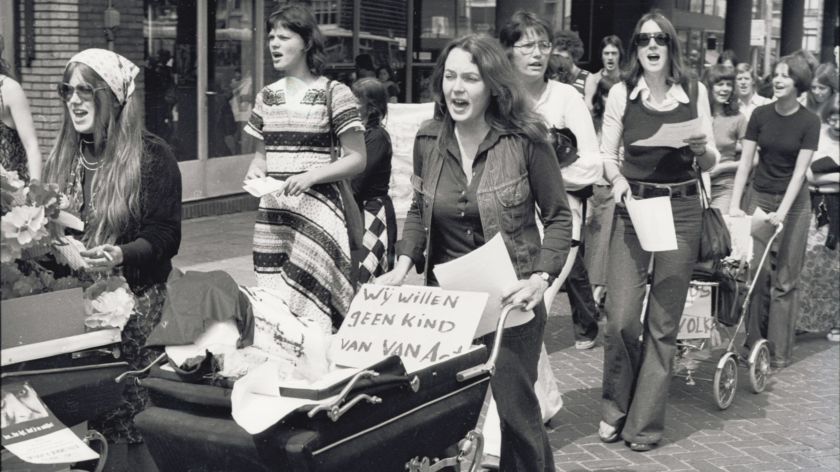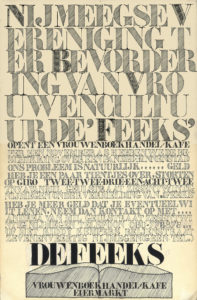De Feeks still mainly sells books by women
-
 Nijmegen protest against plans to shut down abortion clinics. Photo: Liesbeth Sluiter, Lesbian Archive Nijmegen
Nijmegen protest against plans to shut down abortion clinics. Photo: Liesbeth Sluiter, Lesbian Archive Nijmegen
In the mid-1970s, the heyday of the feminist movement, various women’s initiatives sprouted all over Nijmegen. Bookstore De Feeks, in the Van Welderenstraat, is still there today.
In the middle of bookstore De Feeks, owner Henri Jacobs steps enthusiastically around a huge pile of boxes. Next to the boxes is a table with a chessboard, the place where regular customers meet for a chat. How would he describe De Feeks? ‘As one big chaos,’ jokes Jacobs as he heaves a box onto the counter with a thud. He adds in a more serious tone: ‘We are a bookstore specialised in gay, lesbian and feminist literature. And a place where you can get fresh coffee any time of the day.’
At the table sits Renee Schoffelen. She ran the bookstore for twenty years, before selling it ten years ago, on behalf of the association, to Jacobs. ‘The idea for De Feeks came up in the heyday of the feminist movement,’ she says. ‘Nijmegen had a women’s centre and a women’s refuge, women were uniting in support groups. There was also a group of women who wanted a place where we could sell our own books, since in those days books by women were rarely reviewed and hard to find. To get hold of a novel by Renate Dorrestein you almost had to go on the black market.’

In 1977 women’s bookstore De Feeks opened its doors on the Eiermarkt, at the current location of Bistro Romein. ‘A huge building,’ Schoffelen remembers. ‘And that was needed too, because shortly after opening, we were joined by a women’s café and a documentation centre. We were a real free state within Nijmegen.’ A free state that was home to all kinds of actions and protests. ‘For example, we organised the Witch Night, where we patrolled areas of the city where women were often harassed. We also organised actions to shut down pornographic cinema Le Paris. We threw paint at the screen, or glued the locks shut with mastic.’ When Minister of Justice Dries van Agt – the subject of much controversy at the time because of his plan to shut down abortion clinics – visited Nijmegen, he was accosted by a large group of women who threw sanitary towels at his head. ‘They were clean sanitary towels,’ laughs Schoffelen.
Kissing
The lesbian movement was also strong in the 1970s and 1980s. ‘Many lesbians were upset about the largely hetero-normative perspective on women’s issues. For example, in 1981, a Nijmegen Summer School was organised on women’s issues, at which women who fell for women didn’t feature even once.’ According to Schoffelen, lesbians weren’t mentioned anywhere: feminist magazine Opzij didn’t talk about them and they were largely ignored in the University’s study programme on Women’s Studies. Even the women’s café did not provide a safe haven. ‘There was always hassle about whether lesbians should be allowed to kiss or not.’
In those years De Feeks employed a woman who’d worked as an intern in New York, where there was a lesbian herstory archive. The women of De Feeks decided to set up something similar in Nijmegen. This resulted in the Nijmegen Lesbian Archive. Schoffelen: ‘It was intended as a meeting place where women could come for information: books, images, interviews, anything. We also wanted to create a space where lesbians could store their belongings. Sometimes, when a woman died, her family would destroy everything that pointed to her lesbian identity.’ Nowadays, this archive is located in Bottendaal.
Hysteria
In 1986 the women’s café closed its doors. ‘There was simply no interest anymore. Times had changed.’ Women had less need for a meeting place of their own. But the bookstore survived and moved to its current location in the Van Welderenstraat. Here too, the new era made itself felt. ‘At first we only sold books by women. And we were highly critical about content: we didn’t sell books with racist content. No Agatha Christie’s And Then There Were None in our selection!’ As women’s emancipation progressed, women also wanted to read other books. Following many discussions it was decided that the bookstore would also sell some books by men.
In the end, even the epithet ‘women’s bookstore’ fell by the wayside. But most of the books sold by De Feeks are still written by women, emphasises owner Jacobs. ‘70 percent of the books sold by other bookstores are by men. 70 percent of the books we sell are still by women. And the majority of our clientele are women, although that’s probably true of all bookstores.’
Books aimed specifically at a gay audience don’t sell as well as in the 1980s. ‘In those days, 20 percent of our selection consisted of gay books, which accounted for 80 percent of our turnover. This is no longer the case: 80 percent of our turnover comes from regular Dutch literature. But I’m not getting rid of niche books. Even if it takes three years for this kind of book to find a happy buyer, it’s still important that these books are available.’



